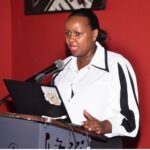By Odhiambo David I odhisdavid59@gmail.com
On May 13, 2020, I was priviledged to attend MESHA’s 20th science café, which to me was just the third in my life. This time round, it was a different experience altogether – it was online! At first, I fidgeted, having not used the software called Zoom before!
My panic was easily solved by the MESHA leadership who gave us what they called a simple tutorial on how to install and navigate to the point of joining the zoom meeting through a link they had provided way before the online science media café!
What else, we had been told that this café would be cross-border, meaning that other countries will also be tuning in together at the same time to listen to a panel of speakers. In the past, the four countries whose support come from avac – Kenya, Uganda, Zambia and Zimbabwe – held separate cafes at different times with different topics and speakers.
Like magic, I tuned in just on time as the moderator of the day, Mr Chaacha Mwita from Internews, an experienced journalist and editor, welcomed us all on board and introduced the first speaker of the day, Zarina Geloo, an award winning science journalist from Zambia who started by saying that she started reporting on HIV before it was even given a name.
Zarina cautioned journalists to always keep safe while writing and reporting on COVID19. As you start to write on COVID-19, you must be clear on how COVID-19 is or is not transmitted,” she said. She also urged the media to investigate the current testing being done and whether the kits are genuine. She added that journalists need to explain plainly that some of the symptoms such as high body temperature can be brought about by many things and should not be taken as the main symptom and an inclusive of coronavirus.
She pointed out that whereas the media is currently burdened by information overload, it is not an excuse for them to stray and publish or broadcast misleading and wrong facts as authentic professionalism must be held.
“A majority of you has been reporting complex HIV stories and interpreting large amounts of data. This experience must be applied snugly on reportage of COVID-19,” she said.
She went ahead to urge journalists to communicate to their audiences with messages that empower and enable them to understand and accept that the virus will be with us for a long time just like HIV.
She as well said that stigma has developed on COVID-19 patients considering the ways in which the health officers handle them. Fear is injected to the public by how the emergency response teams collect the handle the dead and the speed at which those found positive or are suspected of being positive are driven to either quarantine or isolation centres.
Dr William Kilembe, a Zambian scientist noted that the duration between COVID-19 infection and death is so short that a vaccine should be developed within a shorter period of time. He rubbished the mentality that Africans have hard immunity to COVID-19 and said that hard immunity can only be achieved with a vaccine. Therefore, a vaccine should and must be developed as soon as possible to break the spread of the virus.
Other than Zarina and Dr Kilembe, Ms Sylvia Nakasi of Uganda Network of AIDS Services Organisations also spoke emphasizing on the crucial role partnerships between the media and health advocates like herself play in empowering communities to consume and demand for health information in totality, right from the science to use of physical and financial resources.
Once again, as has happened to me ever since I attended my first science café on vaccines, I left the meeting having learnt that as a journalist, the interactions that I am exposed to, through the science cafes, prepare me for the task ahead, perhaps in the near future, perhaps for a long time to come.
The organizations which put the programme together were Zambia Institute of Mass Communication (ZAMCOM) which led its planning and coordination, Media for Environment, Science, Health and Agriculture (MESHA) from Kenya, Humanitarian Information Facilitation Centre from Zimbabwe and Health Journalists Network in Uganda (HEJNU) from Uganda. The Internews team led by Ida Jooste also played a lead role in the success of this café.






